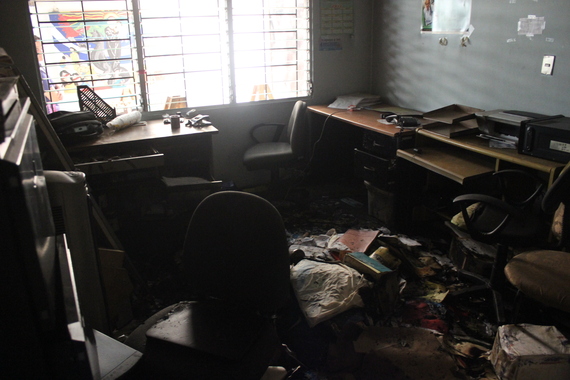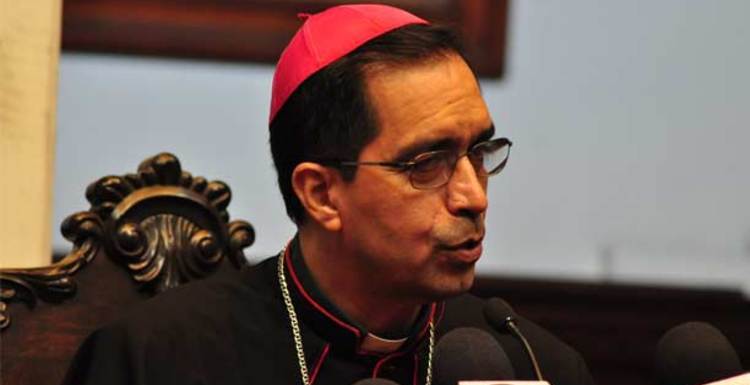Human Rights Archives Under Attack in El Salvador
More than a month after the Catholic Archdiocese of San Salvador closed down the office of El Salvador’s most important human rights archives, Tutela Legal, and dismissed the employees, the issue of ensuring appropriate custody of the records has yet to be resolved. This article aims to follow up on an earlier report by COHA Senior Research Fellow Frederick B. Mills and Research Associates Thomas Abbot and Ian Kowalski. [1]
In the days and weeks following this surprise closure, public outcry has brought international attention to the inexplicable action taken by the Archdiocese. In the wake of Archbishop José Escobar Alas’ refusal to reverse his decision or to transfer custody of the records to an appropriate human rights body, the families of victims and survivors may be stripped of access to testimonials and other documentation related to war crimes and crimes against humanity. The Salvadoran public is crying out for justice, and the nation’s government appears to be listening—at least to an extent. On October 18, a search of the location where the records are currently being stored was conducted after the Salvadoran Attorney General’s office obtained a warrant. The examination specifically targeted 34 of the approximately 50,000 documents for their importance. [2] El Salvador’s Human Rights ombudsman, David Morales, complained that no one from his office was present for the search.
Archbishop Escobar Alas and the Attorney General’s office finally reached an agreement on the need to protect the documents, but there is much debate over what to do with them. El Salvador’s Secretary of Culture attempted to declare the archives “cultural goods,” in order to subsequently make them available to the proper legal authorities. However, Escobar Alas opposed labeling the documents a national patrimony, claiming that such a categorization was unconstitutional. The Archbishop then took the case to the Salvadoran Supreme Court, which ruled that the records would be retained by the Archdiocese for the time being, giving legal legitimacy to the Archbishop’s hold on them. [3] The fate of Tutela Legal’s archives is still up in the air, as the Church maintains that it is the sole owner of the records.
Wounds that Can’t Heal
One year after the 1992 Peace Accords that ended 12 years of civil war, El Salvador’s amnesty law made Tutela Legal’s mission of remembrance even more important by limiting the possibility of justice and reparation for the many human rights violations committed during the nation’s civil war. However, some cases have been successfully tried in the United States, and one has been referred to the IAHCR. [4] The timing of the closure by the Catholic Archdiocese of San Salvador raised suspicions because it came just 10 days after the Salvadoran Supreme Court agreed to hear arguments about the constitutionality of the legislation. In August of 2011, before El Salvador’s usually-conservative Supreme Court was considering repealing the amnesty law, Archbishop José Luis Escobar Alas stated:
“I could not imagine if all the cases were opened. When will we live in peace, I do not think this generation wants to spend their lives discussing the past, especially as there are abundant cases committed by both sides … Possibly the Amnesty Law is the most appropriate mechanism to maintain peace.” [5]
The arguments for closing Tutela Legal, taken together, do not appear to be consistent. The reason Escobar Alas initially gave for the shutdown was that Tutela Legal’s personnel had performed “irregular practices” with the organization’s finances. This claim has not been substantiated. The employees of Tutela Legal arrived at work on September 30 to find that the doors to the office were padlocked shut, that they were unemployed, and that they had ten minutes to remove their belongings while being escorted by security guards. The Archbishop then argued that the end of the war had made Tutela Legal functionally irrelevant. Such an argument did not sit well with those hoping to end impunity in El Salvador. [6] Presently, Escobar Alas is saying that the office closed as a result of organizational restructuring and claims that measures are underway for the creation of a new office.
The changing nuances of the Archbishop’s arguments may be related to the immediate and growing push back by El Salvador’s social movements and by the international human rights community. The office’s former employees have not been demoralized; on the contrary, they are now working on opening a new human rights office without the help of the Archdiocese, receiving funding from some of the same international organizations that backed Tutela Legal.
Moving Forward
Despite Monsignor Escobar’s claims that a new office will be opened soon, former employees of Tutela Legal are in the process of forming their own office, to be titled “Tutela Legal Doctora María Julia Hernández,” after the woman who served as director of the office from 1983 to 2007. [9] The venture will be backed by international Catholic aid foundations from nations such as the United Kingdom, Spain, and France. Activists in El Salvador, international human rights organizations, and solidarity networks are hoping to obtain further support from the Catholic Church by writing a letter to Pope Francis, who at the time of the closing was aware of efforts being made for the beatification of Archbishop Romero, the founder of Tutela Legal’s predecessor, Socorro Jurídico. [10, see footnote] Whatever promises it makes about protecting the safety and legacy of the archives, the word of the Archdiocese of San Salvador has been seriously compromised and human rights groups are closely monitoring any deterioration of the situation, urging that the integrity and security of the archives be maintained. And no matter what the motives behind the closure may be, hopefully the cumulative effort of the many groups working to get the case files into the hands of a reliable human rights body, rather than the Archdiocese, will be successful, and some of San Salvador’s most treasured archives of rights-related documents will remain intact.

Breaking News:
At 4:30 A.M. on November 14, three armed assailants plundered the Pro-Búsqueda human rights office in San Salvador. Two security guards were reportedly beaten and tied up while the perpetrators set fire to records and stole computers. In light of the withholding of Tutela Legal’s 50,000 archives, the attack on Pro-Búsqueda, which holds additional records of El Salvador’s 1980-1992 civil war, poses further challenges to the preservation of the essential historic memory of the war and any possible termination of the impunity of war criminals that has prevailed in El Salvador since the passage of the Amnesty Law of 1993. While the extent of the damage at Pro-Búsqueda is not yet known, there is concern that the loss may have a strong impact on some of the 1000 open cases and also may compromise any future prosecutions of the perpetrators of the disappearances. The Foundation for the Study of the Application of the Law (FESPAD) has characterized this crime as a “terrorist attack” and the Ombudsman for Human Rights, David Morales, has described it as reminiscent of the war. A motive has not yet been identified, but it is clear that both events are a threat to the crucial archives of the human rights violations of El Salvador’s civil war.
Pro-Búsqueda was founded by Jesuit Priest Jon de Cortina in 1994 to establish an office that would be charged with searching for children who disappeared during the civil war (1979 – 1992). Thanks to Pro-Búsqueda’s meticulous research, so far 235 children out of the more than 1200 cases referred for investigation have been located and informed about their birth parents. In the large majority of cases, state actors have been implicated in the sale, referral for adoption (mostly in Europe and the United States), or the raising of these children.
Erika Johnson, Research Associate at the Council on Hemispheric Affairs
Please accept this article as a free contribution from COHA, but if re-posting, please afford authorial and institutional attribution. Exclusive rights can be negotiated.
For additional news and analysis on Latin America, please go to:LatinNews.com and Rights Action
References
[1] https://coha.org/tutela-legal-closed-in-el-salvador-amid-concern-over-the-fate-of-valuable-archives/
[2] http://www.laprensagrafica.com/2013/10/22/fiscalia-requiere-34-archivos-de-tutela-legal [3] http://www.cispes.org/topcontent/espanol-protect-romeros-legacy-denounce-closure-tutela-legal/
[6] Ibid, UpsideDownWorld
[7] Ibid.
[8] http://www.ipsnews.net/2013/10/activists-struggle-to-recover-human-rights-archives/
[9] http://tutelalegalmariajh.com/
[10] *Archbishop Romero was murdered while conducting mass on March 24, 1980. Pope Francis is promoting that he be made a saint, says the National Catholic Reporter, which could be fulfilled without the attribution of a miracle if his status as a martyr, which has already been publicly stated by previous popes, is officially confirmed. http://ncronline.org/blogs/ncr-today/francis-unblocks-romero-beatification-official-says


